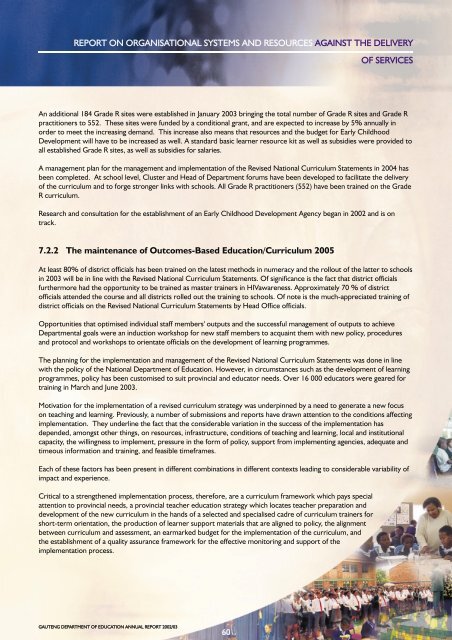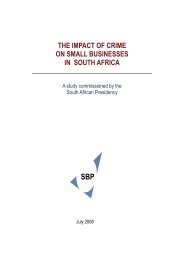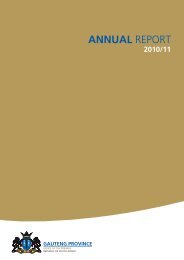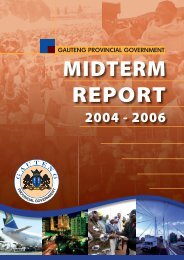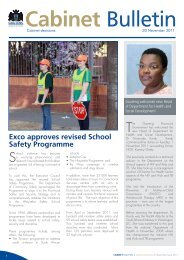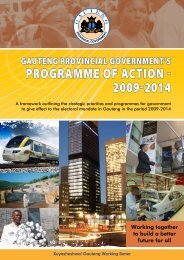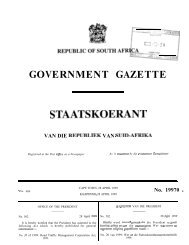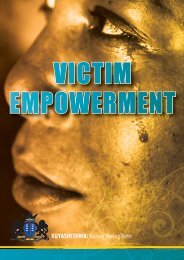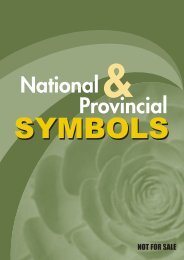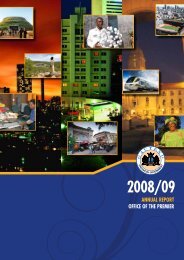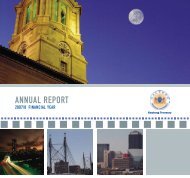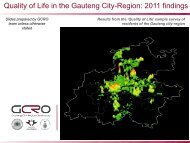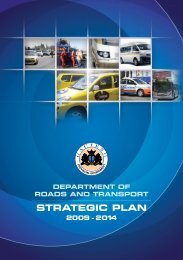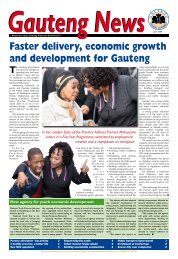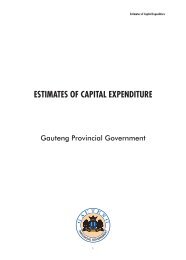Education Annual Report 2002-2003 - Gauteng Online
Education Annual Report 2002-2003 - Gauteng Online
Education Annual Report 2002-2003 - Gauteng Online
Create successful ePaper yourself
Turn your PDF publications into a flip-book with our unique Google optimized e-Paper software.
REPORT ON ORGANISATIONAL SYSTEMS AND RESOURCES AGAINST THE DELIVERYOF SERVICESAn additional 184 Grade R sites were established in January <strong>2003</strong> bringing the total number of Grade R sites and Grade Rpractitioners to 552. These sites were funded by a conditional grant, and are expected to increase by 5% annually inorder to meet the increasing demand. This increase also means that resources and the budget for Early ChildhoodDevelopment will have to be increased as well. A standard basic learner resource kit as well as subsidies were provided toall established Grade R sites, as well as subsidies for salaries.A management plan for the management and implementation of the Revised National Curriculum Statements in 2004 hasbeen completed. At school level, Cluster and Head of Department forums have been developed to facilitate the deliveryof the curriculum and to forge stronger links with schools. All Grade R practitioners (552) have been trained on the GradeR curriculum.Research and consultation for the establishment of an Early Childhood Development Agency began in <strong>2002</strong> and is ontrack.7.2.2 The maintenance of Outcomes-Based <strong>Education</strong>/Curriculum 2005At least 80% of district officials has been trained on the latest methods in numeracy and the rollout of the latter to schoolsin <strong>2003</strong> will be in line with the Revised National Curriculum Statements. Of significance is the fact that district officialsfurthermore had the opportunity to be trained as master trainers in HIVawareness. Approximately 70 % of districtofficials attended the course and all districts rolled out the training to schools. Of note is the much-appreciated training ofdistrict officials on the Revised National Curriculum Statements by Head Office officials.Opportunities that optimised individual staff members' outputs and the successful management of outputs to achieveDepartmental goals were an induction workshop for new staff members to acquaint them with new policy, proceduresand protocol and workshops to orientate officials on the development of learning programmes.The planning for the implementation and management of the Revised National Curriculum Statements was done in linewith the policy of the National Department of <strong>Education</strong>. However, in circumstances such as the development of learningprogrammes, policy has been customised to suit provincial and educator needs. Over 16 000 educators were geared fortraining in March and June <strong>2003</strong>.Motivation for the implementation of a revised curriculum strategy was underpinned by a need to generate a new focuson teaching and learning. Previously, a number of submissions and reports have drawn attention to the conditions affectingimplementation. They underline the fact that the considerable variation in the success of the implementation hasdepended, amongst other things, on resources, infrastructure, conditions of teaching and learning, local and institutionalcapacity, the willingness to implement, pressure in the form of policy, support from implementing agencies, adequate andtimeous information and training, and feasible timeframes.Each of these factors has been present in different combinations in different contexts leading to considerable variability ofimpact and experience.Critical to a strengthened implementation process, therefore, are a curriculum framework which pays specialattention to provincial needs, a provincial teacher education strategy which locates teacher preparation anddevelopment of the new curriculum in the hands of a selected and specialised cadre of curriculum trainers forshort-term orientation, the production of learner support materials that are aligned to policy, the alignmentbetween curriculum and assessment, an earmarked budget for the implementation of the curriculum, andthe establishment of a quality assurance framework for the effective monitoring and support of theimplementation process.GAUTENG DEPARTMENT OF EDUCATION ANNUAL REPORT <strong>2002</strong>/0360


